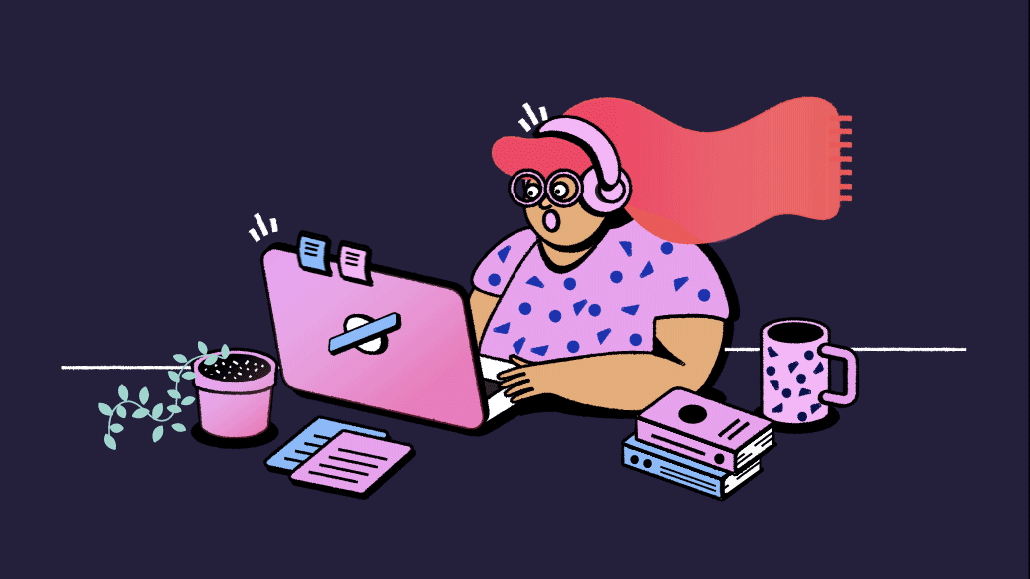Secure your place at the Digiday Media Buying Summit in Nashville, March 2-4
Esports orgs are creating non-male teams to attract new advertising deals

Esports organizations are starting to show that they believe creating non-all male teams will widen their reach and secure new brand partnerships.
On Monday, esports org Misfits launched its first all-female/trans team, Misfits Black. The squad will compete in VCT Game Changers, a Valorant league geared toward women and other marginalized genders, which is administered by Nerd Street Gamers and associated with Riot Games’ Valorant Champions Tour.
Misfits’ new team comes with new brand partners for the company: gaming peripherals brand HyperX and hair products company Splat. Both sponsors were signed specifically for Misfits’ non-male Valorant team, said Misfits CEO Ben Spoont, who did not share the terms of their agreements.
A partnership with Misfits’ non-male Valorant team lines up with HyperX’s broader commitment to support women in the gaming community, which the company said was a priority last year. “As HyperX continues to activate with teams and organizations that align with inclusivity and diversity leadership activities in the industry, Misfits reached out to HyperX with aligned values in mind,” said HyperX esports sponsorships supervisor Kitty Cao.
Misfits Black will heavily feature its brand partners in its original content; in the team’s announcement video, some of its members can be seen wearing Splat products. “We recognize that our partners are also seeking these types of marketing opportunities, and we’re thrilled that we can create a win-win,” Spoont said.
Misfits is the latest esports org to bring on new partners via its non-male teams. In February, G2 Esports signed a partnership with computer hardware manufacturer Seasonic that was “equal terms,” meaning both the org’s male and female Valorant teams received the same partnership terms and will be equally involved in Seasonic-related activations. “The G2 female Valorant team, known as G2 Gozen, comprises some of the most successful and prominent female esports talent within the industry,” said G2 commercial director Sabrina Ratih. “We wouldn’t accept anything less than an equal terms partnership in this instance.”
Seasonic explicitly signed the partnership because of G2’s presence in female esports. “For a long time, professional esports has been a male-dominated sector. Undoubtedly, there are many females who are gaming at higher levels, yet they remain underrepresented in the competitive arena,” said Seasonic global marketing head Walter Sun. “When we heard that G2 will have an all-female Valorant team, we immediately wanted to be part of this new direction.”
The proliferation of all-female esports teams — and their brand partners — is a relatively recent phenomenon. Part of this growth is due to the rise of Valorant esports; the competitive Valorant scene is markedly more diverse than some other esports communities due to Riot Games’ support of initiatives such as VCT Game Changers. However, some orgs have fielded female teams since long before the 2020 release of Valorant. For example, Dignitas acquired its all-female Counter-Strike team in 2017, though most of the team’s players made the switch to Valorant three years later. “They’ve been one of the few teams that have effectively changed games and remained as competitive,” said Dignitas svp of partnerships John Spiher.
Dignitas’s experience in the female esports space has led it to sign many partnerships with brands looking to reach this specific subset of the gaming community. Spiher flagged the org’s partnership with makeup brand NYX, inked last year, as a recent case. “While makeup absolutely is for everyone, a disproportionate part of their consumer base are women. Cosmetics are such a core part of how our Valorant team looks good, feels good, plays good,” Spiher said.
While Spiher is encouraged by equal-term deals such as the aforementioned G2–Seasonic partnership, he said that such equity has long been the standard for Dignitas’s teams, regardless of gender. “If that’s not the standard, then boy, that seems like a bigger problem for your organization.”
Unlike the traditional sports scene, success in esports has more to do with a player’s strategic mind and reaction time than their physical size or strength. Many experts believe that the significant gender imbalance in the industry has more to do with cultural blockers preventing women from engaging with the scene, such as misogynist harassment, casual sexism and widespread misconceptions about women’s lack of gaming skill, rather than any inherent lack of gaming ability on the part of female players. The marked rise in the number of professional all-female esports teams in the space in recent years supports this notion. As women become increasingly prominent in esports, brands are beginning to take notice of the teams that are successfully capitalizing on this demographic shift.
“Crazy concept: women are important,” Spiher said. “I have no idea how this hasn’t been a higher priority for more organizations.”
More in Marketing

Future of Marketing Briefing: AI’s branding problem is why marketers keep it off the label
The reputational downside is clearer than the branding upside, which makes discretion the safer strategy.

While holdcos build ‘death stars of content,’ indie creative agencies take alternative routes
Indie agencies and the holding company sector were once bound together. The Super Bowl and WPP’s latest remodeling plans show they’re heading in different directions.

How Boll & Branch leverages AI for operational and creative tasks
Boll & Branch first and foremost uses AI to manage workflows across teams.








